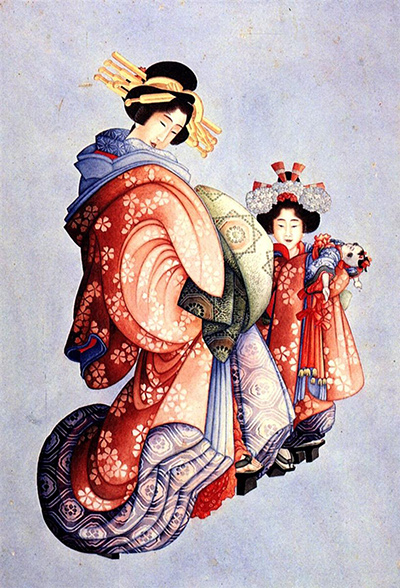Hokusai
Oiran and Kamuro by Hokusai
Oiran and Kamuro is a woodblock print showing a a woman and a girl. The woman is dressed in fully traditional attire in a lush robe and hair ornaments. She is the ‘oiran’, or the prostitute. Oiran were not just women providing sex, though. Their job was to entertain, please, and give their time to men.
The oiran were often trendsetters in fashion. Waiting on the oiran is a young girl – her attendant. These maids were known as ‘kamuro’. These girls were close to their mistresses and learned the trade in waiting. They were basically apprentices to the oiran, and eventually branched out on their own. The picture depicts the relationship between the oiran and her kamuro beautifully. Both are dressed in the same kind of dress with the same patterns – presumably created from the same length of cloth. This shows their closeness to each other.
The richness of the dresses also indicates the fact that oiran were the highest order of prostitutes in Edo Japan, and were in service to the feudal lords. The oiran’s makeup and hairstyle shows her status, singling her out as a woman of pleasure. The kamuro’s hairstyle is quite different, showing her lower status. She is carrying a doll in her hand – an indication of her age. Most kamuro were indentured into service between the ages of five to nine. Oiran and Kamuro is only one of the 3000 plus block prints produced by Hokusai during his career spanning more than 70 years. But it remains an interesting view of a period in Japan.
Katsushika Hokusai was a Japanese artist, renowned during the Edo period for his paintings, prints, and woodblocks. As a child, he worked in a bookshop and later as an apprentice to a wood carver. He studied wood block printing from Katsukawa Shunshō and published his first prints in 1779. Hokusai’s work was greatly influenced by Chinese art of the time. He was famous for his block prints and his series One Hundred Views of Mount Fuji is generally considered a masterpiece. Hokusai had extensive influence in art, and even inspired European artists. He also prompted the Art Nouveau movement in Europe.
